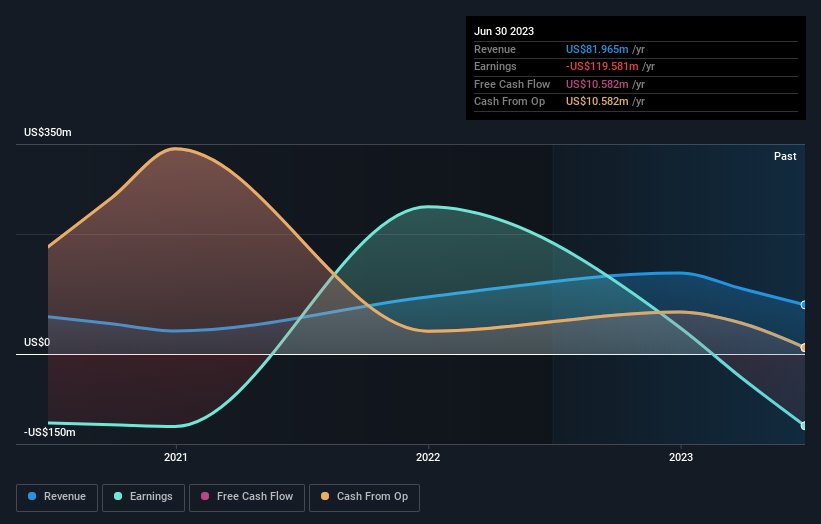With 51% ownership of the shares, NexPoint Diversified Real Estate Trust (NYSE:NXDT) is heavily dominated by institutional owners
Key Insights
Institutions' substantial holdings in NexPoint Diversified Real Estate Trust implies that they have significant influence over the company's share price
50% of the business is held by the top 12 shareholders
Every investor in NexPoint Diversified Real Estate Trust (NYSE:NXDT) should be aware of the most powerful shareholder groups. The group holding the most number of shares in the company, around 51% to be precise, is institutions. In other words, the group stands to gain the most (or lose the most) from their investment into the company.
Since institutional have access to huge amounts of capital, their market moves tend to receive a lot of scrutiny by retail or individual investors. Therefore, a good portion of institutional money invested in the company is usually a huge vote of confidence on its future.
Let's take a closer look to see what the different types of shareholders can tell us about NexPoint Diversified Real Estate Trust.
Check out our latest analysis for NexPoint Diversified Real Estate Trust
What Does The Institutional Ownership Tell Us About NexPoint Diversified Real Estate Trust?
Many institutions measure their performance against an index that approximates the local market. So they usually pay more attention to companies that are included in major indices.
NexPoint Diversified Real Estate Trust already has institutions on the share registry. Indeed, they own a respectable stake in the company. This implies the analysts working for those institutions have looked at the stock and they like it. But just like anyone else, they could be wrong. It is not uncommon to see a big share price drop if two large institutional investors try to sell out of a stock at the same time. So it is worth checking the past earnings trajectory of NexPoint Diversified Real Estate Trust, (below). Of course, keep in mind that there are other factors to consider, too.
Investors should note that institutions actually own more than half the company, so they can collectively wield significant power. NexPoint Diversified Real Estate Trust is not owned by hedge funds. Looking at our data, we can see that the largest shareholder is the CEO James Dondero with 13% of shares outstanding. For context, the second largest shareholder holds about 8.6% of the shares outstanding, followed by an ownership of 5.8% by the third-largest shareholder.
After doing some more digging, we found that the top 12 have the combined ownership of 50% in the company, suggesting that no single shareholder has significant control over the company.
While studying institutional ownership for a company can add value to your research, it is also a good practice to research analyst recommendations to get a deeper understand of a stock's expected performance. Our information suggests that there isn't any analyst coverage of the stock, so it is probably little known.
Insider Ownership Of NexPoint Diversified Real Estate Trust
The definition of an insider can differ slightly between different countries, but members of the board of directors always count. Company management run the business, but the CEO will answer to the board, even if he or she is a member of it.
I generally consider insider ownership to be a good thing. However, on some occasions it makes it more difficult for other shareholders to hold the board accountable for decisions.
Our information suggests that insiders maintain a significant holding in NexPoint Diversified Real Estate Trust. Insiders have a US$42m stake in this US$302m business. We would say this shows alignment with shareholders, but it is worth noting that the company is still quite small; some insiders may have founded the business. You can click here to see if those insiders have been buying or selling.
General Public Ownership
The general public-- including retail investors -- own 35% stake in the company, and hence can't easily be ignored. While this group can't necessarily call the shots, it can certainly have a real influence on how the company is run.
Next Steps:
I find it very interesting to look at who exactly owns a company. But to truly gain insight, we need to consider other information, too. Consider risks, for instance. Every company has them, and we've spotted 2 warning signs for NexPoint Diversified Real Estate Trust you should know about.
Of course this may not be the best stock to buy. So take a peek at this free free list of interesting companies.
NB: Figures in this article are calculated using data from the last twelve months, which refer to the 12-month period ending on the last date of the month the financial statement is dated. This may not be consistent with full year annual report figures.
Have feedback on this article? Concerned about the content? Get in touch with us directly. Alternatively, email editorial-team (at) simplywallst.com.
This article by Simply Wall St is general in nature. We provide commentary based on historical data and analyst forecasts only using an unbiased methodology and our articles are not intended to be financial advice. It does not constitute a recommendation to buy or sell any stock, and does not take account of your objectives, or your financial situation. We aim to bring you long-term focused analysis driven by fundamental data. Note that our analysis may not factor in the latest price-sensitive company announcements or qualitative material. Simply Wall St has no position in any stocks mentioned.


